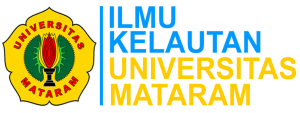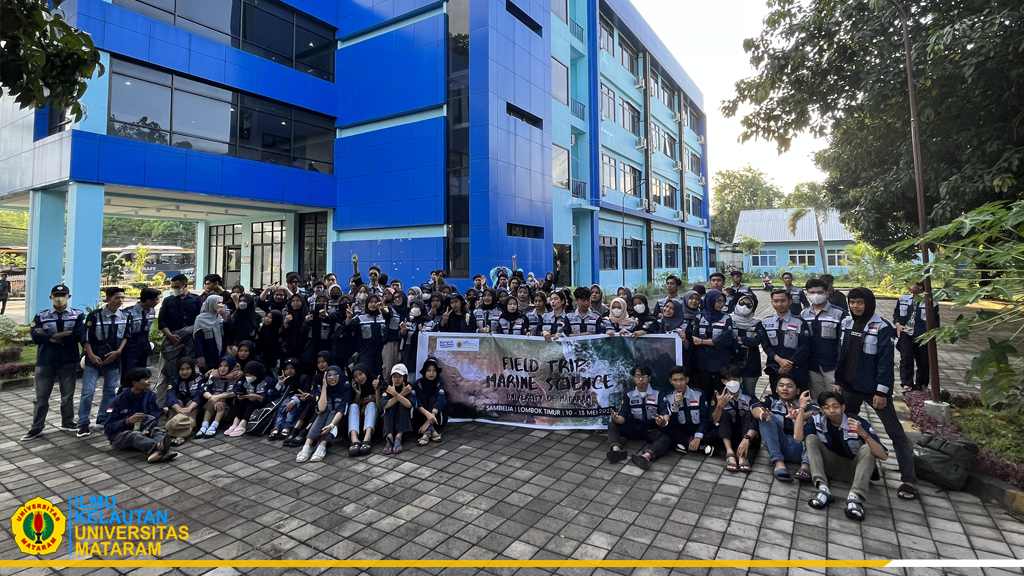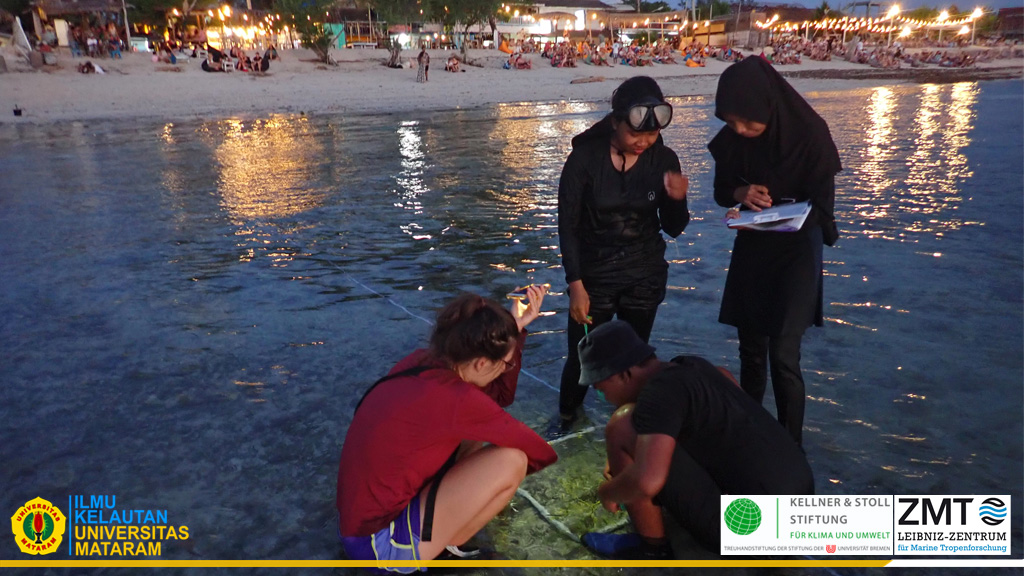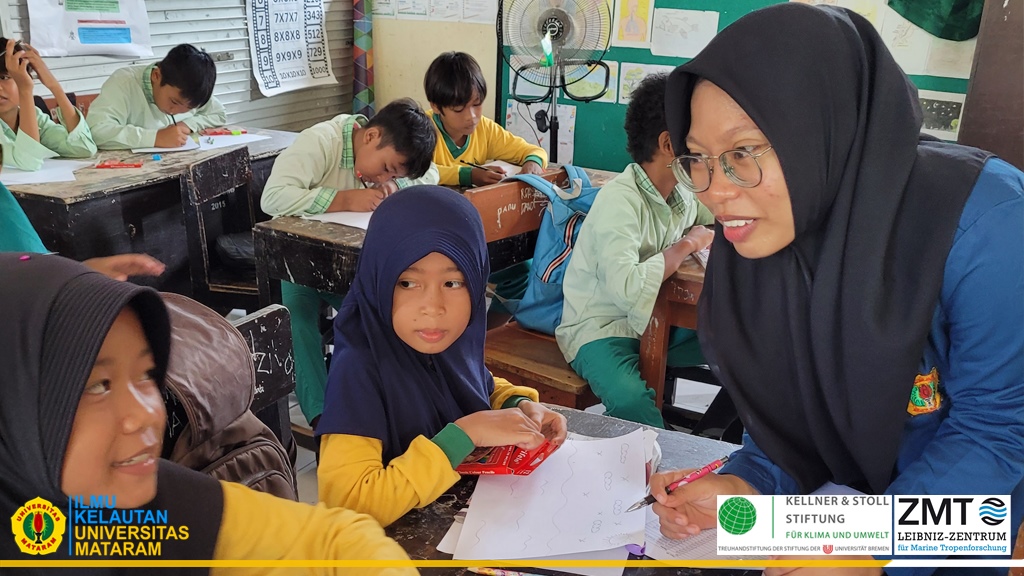Prodi Ilmu Kelautan Unram dan National University of Singapore College Gelar Workshop Internasional Ekosistem Mangrove
Mataram, 3 & 8 Juni 2024 – Program Studi Ilmu Kelautan di Universitas Mataram, bekerja sama dengan National University of Singapore College, menyelenggarakan workshop internasional yang difokuskan pada ekosistem mangrove. Workshop ini mengumpulkan dosen, peneliti, dan mahasiswa dari kedua universitas untuk membahas dan menjelajahi peran penting ekosistem mangrove dalam perlindungan pantai, konservasi biodiversitas, dan pemanfaatannya secara berkelanjutan.
Workshop ini diadakan di Universitas Mataram dan area ekosistem Mangrove Eyat Mayang, Lembar, Lombok Barat. Kegiatan yang dilakukan yakni serangkaian kuliah, kegiatan praktik, dan kunjungan lapangan ke lokasi mangrove. Peserta mendapatkan kesempatan untuk berinteraksi dengan dosen dan peneliti di bidang tersebut. Kegiatan tersebut bertujuan untuk mengembangkan ide proyek kolaboratif mahasiswa dari kedua Universitas dalam meningkatkan pemahaman dan pelestarian ekosistem mangrove.
Dr. Bambang Dipokusumo, M.Si selaku dekan Fakultas Pertanian Universitas Mataram, menyatakan antusiasmenya terhadap workshop ini, mengatakan “Kolaborasi ini dengan National University of Singapore College adalah kesempatan luar biasa bagi mahasiswa dan peneliti kami untuk mendapatkan wawasan berharga dan berkontribusi pada upaya pelestarian mangrove. Harapannya mahasiswa dan dosen dari Universitas Mataram dan National University of Singapore dapat bekerja sama dalam menunjang Tridharma Perguruan Tinggi yakni pendidikan, penelitian, dan pengabdian kepada masyarakat”
Dr. Donald Favareau, tutor dari National University of Singapore, menyoroti pentingnya workshop internasional seperti ini, mengatakan, “Mangrove sangat penting untuk menjaga keberlanjutan komunitas pantai dan keanekaragaman hayati di dalamnya. Workshop ini adalah platform yang sangat baik untuk pertukaran pengetahuan dan penelitian yang dilakukan di area ekosistem mangrove.”

Dekan Fakultas Pertanian Unram dan Para Dosen NUS College_
Metodologi implementasi untuk workshop Biodiversitas dan Ekologi Mangrove dirancang untuk memberikan pengalaman belajar yang komprehensif dan mendalam melalui berbagai komponen, sebagai berikut:
Kegiatan Lapangan
Kegiatan lapangan menjadi aspek utama dari workshop ini, memberikan pengalaman langsung di ekosistem mangrove. Dipimpin oleh Chandrika Eka Larasati, M.Si, Rhojim Wahyudi, M.Si, Rusmin Nuryadin, M.Si, Sholihati Lathifa Sakina, S.Si., M.T, dan Ir. Saptono Waspodo, M.Si, kegiatan lapangan meliputi:
- Pentingnya Ekosistem Mangrove: Diskusi tentang signifikansi ekologis, ekonomi, dan sosial dari mangrove.
- Penjelasan tentang Spesies Mangrove: Informasi terperinci tentang berbagai spesies mangrove yang ditemukan di daerah tersebut.
- Pengumpulan Data Mangrove: Pengumpulan data tentang diameter pada ketinggian dada (DBH), tinggi pohon, kanopi, biota yang terkait, dan karakteristik sedimen dan perairan untuk memahami aspek fisik dan biologis dari ekosistem.
- Pengumpulan Spesimen Mangrove untuk Herbarium: Mengumpulkan dan melestarikan spesimen tumbuhan untuk studi dan referensi lebih lanjut.

Chandrika Eka Larasati, M.Si memberi kuliah ekosistem mangrove_

mahasiswa melakukan observasi ekosistem mangrove_
Kuliah
Kuliah melengkapi kegiatan lapangan dengan menyediakan pengetahuan teoritis dan wawasan. Topiknya meliputi:
- Perikanan dan Ilmu Kelautan: Kuliah umum tentang pentingnya perikanan dan ilmu kelautan dalam memahami dan mengelola ekosistem pantai oleh Dr. Soraya Gigentika.
- Aspek Sosial dan Budaya Pulau Lombok: Tinjauan tentang dinamika sosial dan budaya Pulau Lombok, dengan menekankan interaksi antara komunitas lokal dan lingkungan alam mereka, termasuk ekosistem mangrove, oleh Ir. Saptono Waspodo, M.Si.
- Presentasi tentang Kehidupan dan Lingkungan Laut (Mahasiswa NUS): Presentasi selama 20 menit oleh seorang mahasiswa dari National University of Singapore tentang kehidupan dan lingkungan laut.
- Presentasi tentang Kegiatan Workshop (Salvina): Presentasi selama 20 menit oleh seorang mahasiswa dari Program Studi Ilmu Kelautan di Universitas Mataram tentang kegiatan workshop. Kuliah-kuliah ini bertujuan untuk mendalami pemahaman peserta tentang dimensi ekologis, ekonomis, dan sosial dari ekosistem mangrove.

Dr. Soraya Gigentika memberi kuliah potensi perikanan dan kelautan NTB_

mahasiswa NUS College mempresentasikan hasil diskusi_
Kerja Laboratorium
Kerja laboratorium memberikan peserta kesempatan untuk terlibat dalam analisis ilmiah yang mendetail. Kegiatan meliputi persiapan herbarium, di mana peserta belajar teknik untuk melestarikan spesimen tanaman. Identifikasi plankton melibatkan pemeriksaan sampel untuk mengidentifikasi berbagai spesies plankton, yang merupakan indikator penting kualitas air dan kesehatan ekosistem. Observasi terumbu karang memungkinkan peserta untuk mempelajari sampel terumbu karang, memahami strukturnya dan peran yang mereka mainkan dalam biodiversitas laut.
Herbarium Mangrove dan Diskusi Terbuka
Membuat herbarium mangrove dan mengadakan diskusi terbuka tentang temuan dan pengalaman hari itu memberikan peserta kesempatan untuk merenungkan observasi lapangan mereka dan berbagi wawasan dengan rekan-rekan mereka. Sesi ini memfasilitasi kolaborasi, pertukaran pengetahuan, dan pemahaman yang lebih dalam tentang ekosistem mangrove.
Berbagi Hasil dan Upacara Penutupan
Selama upacara penutupan, hasil dari herbarium mangrove dibagikan dengan mahasiswa National University of Singapore, diikuti dengan sesi foto bersama untuk menutup selesainya workshop dengan sukses.

Mahasiswa dan herbarium_

mahasiswa dan Reeftank_
Mataram, June 3-8, 2024 – The Marine Science Study Program at the University of Mataram, in collaboration with the National University of Singapore College, organized an international workshop focused on mangrove ecosystems. This workshop brought together professors, researchers, and students from both universities to discuss and explore the vital role of mangrove ecosystems in coastal protection, biodiversity conservation, and sustainable utilization.
The workshop took place at the University of Mataram and the Eyat Mayang Mangrove Restoration Station, Lembar, West Lombok. It featured a series of lectures, practical activities, and field visits to mangrove sites. Participants had the opportunity to interact with professors and researchers in the field, share research findings, and develop collaborative project ideas aimed at enhancing understanding and preservation of mangrove ecosystems.
Dr. Bambang Dipokusumo, the dean of the Faculty of Agriculture at the University of Mataram, expressed his enthusiasm for the workshop, stating, “This collaboration with the National University of Singapore College provides an outstanding opportunity for our students and researchers to gain valuable insights and contribute to mangrove conservation efforts.”
Donald Favareau, a tutor from the National University of Singapore, emphasized the importance of such international workshops, saying, “Mangroves are crucial for sustaining coastal communities and preserving biodiversity. This workshop serves as an excellent platform for knowledge exchange and research in this critical area.”
The implementation methodology for the Mangrove Biodiversity and Ecology workshop was designed to provide a comprehensive and immersive learning experience through various components:
Field Activities
Fieldwork was a major aspect of the workshop, offering direct experience in mangrove ecosystems. Led by Chandrika Eka Larasati, M.Sc., Rhojim Wahyudi, M.Sc., Rusmin Nuryadin, M.Sc., and Ir. Saptono Waspodo, M.Sc., field activities included:
- Importance of Mangrove Ecosystems: Discussions on the ecological, economic, and social significance of mangroves.
- Mangrove Species Explanation: Detailed information about various mangrove species found in the region.
- Mangrove Data Collection: Gathering data on diameter at breast height (DBH), tree height, associated biota, and sediment characteristics to understand the physical and biological aspects of the ecosystem.
- Mangrove Specimen Collection for Herbarium: Collecting and preserving plant specimens for further study and reference.
Participants measured tree diameter and height to gather data on the physical characteristics of mangrove trees essential for understanding their role in the ecosystem. Canopy analysis helped assess the coverage and health of the mangrove forest. Studies on biota association explored relationships between different species within the ecosystem. Additionally, participants conducted water quality assessments to evaluate the health of the aquatic environment.
Lectures
Lectures complemented field activities by providing theoretical knowledge and insights. Topics included:
- Fisheries and Marine Science: A general lecture on the importance of fisheries and marine science in understanding and managing coastal ecosystems by Dr. Soraya Gigentika.
- Social and Cultural Aspects of Lombok Island: An overview of the social and cultural dynamics of Lombok Island, emphasizing interactions between local communities and their natural environment, including mangrove ecosystems, by Ir. Saptono Waspodo, M.Sc.
- Presentation on Marine Life and Environment (NUS Student): A 20-minute presentation by a student from the National University of Singapore on marine life and the environment.
- Presentation on Workshop Activities (Salvina): A 20-minute presentation by a student from the Marine Science Study Program at the University of Mataram about workshop activities.
These lectures aimed to deepen participants’ understanding of the ecological, economic, and social dimensions of mangrove ecosystems.
Laboratory Work
Laboratory work provided participants with opportunities for detailed scientific analysis. Activities included herbarium preparation, where participants learned techniques for preserving plant specimens. Plankton identification involved examining samples to identify various plankton species, crucial indicators of water quality and ecosystem health. Coral observation allowed participants to study coral samples, understanding their structure and role in marine biodiversity.
Mangrove Herbarium and Open Discussion
Creating a mangrove herbarium and holding an open discussion about the day’s findings and experiences provided participants with the opportunity to reflect on their fieldwork observations and share insights with their peers. This session facilitated collaboration, knowledge exchange, and deeper understanding of mangrove ecosystems.
Results Sharing and Closing Ceremony
During the closing ceremony, the results of the mangrove herbarium were shared with National University of Singapore students. The head of the Faculty of Agriculture delivered closing remarks, followed by a group photo session to commemorate the successful completion of the workshop.
Overall, the implementation methodology of this workshop ensured a balanced mix of practical fieldwork, theoretical lectures, and detailed laboratory work, providing a comprehensive approach to studying and understanding mangrove biodiversity and ecology.
- Penulis: Mahardika Rizqi Himawan, M.Si, Wiwid Andriyani Lestariningsih, M.Si,






Tried out 79kings1 last night. Site looks a little dated, but the games are there. Not a bad option if you’re not too fussy about the design. Could be worth a look if you’re bored. 79kings1
Heard some buzz about sv66r. Gonna check it out and see what all the hype is about! Wish me luck. Find it here: sv66r
W88.ngo looks legit! I’ve heard good things, might give it a shot. Seems like a solid option for betting. Check it out folks! w88.ngo